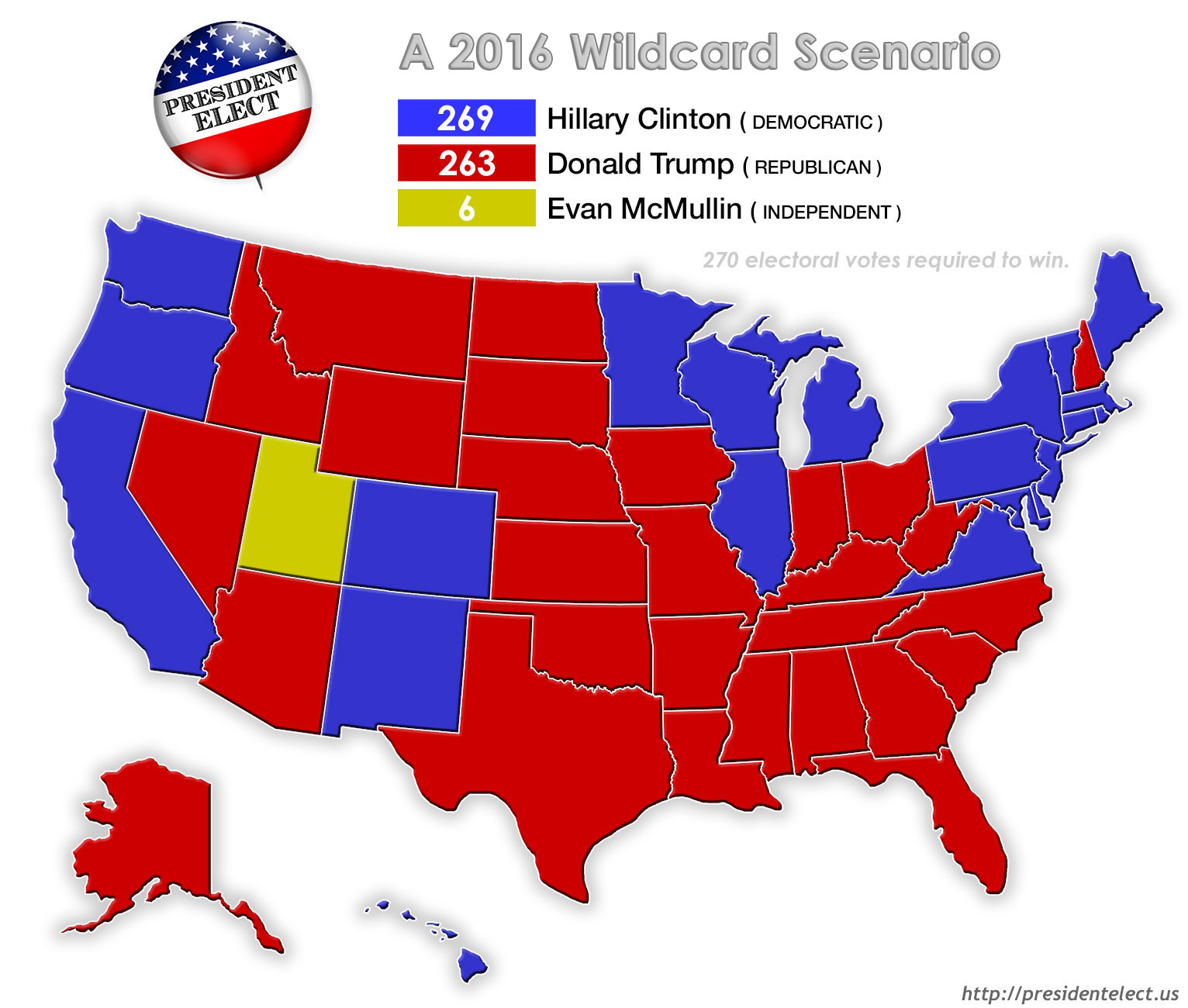
the Electoral College
for 25 Years!
1999 - 2024
election year or...
Ads are placed by Google. No endorsement by President Elect should be inferred.
A few weeks ago, I wrote of a scenario where a wildcard candidate who isn't running could sneak into the presidency via a couple of faithless electors. That chain of events is very unlikely. However, there is an actual situation developing now that could put a wildcard candidate into the Oval Office without needing electors. While some of the maneuvering would be the same, there are some important differences.
Utah is a reliably Republican state. They have voted for the party in every election since 1968, and all but one election since 1952. Since 2000, every GOP candidate has won by huge margins.
| 2000 | Bush (R) | 67% | Gore (D) | 27% | R +40% | |||
| 2004 | Bush (R) | 73% | Kerry (D) | 26% | R +47% | |||
| 2008 | McCain (R) | 63% | Obama (D) | 35% | R +28% | |||
| 2012 | Romney (R) | 73% | Obama (D) | 25% | R +48% |
But it appears their loyalty is not to the party but to their ideology. And based on recent polling a significant portion of the state doesn't believe Donald Trump shares their principles. In two different polls in the last month, Trump led by 1%, and was trailing in a third poll by 4%!
 That might sound like good news for the Democrats. But it is actually a conservative independent candidate named Evan McMullin who is siphoning support from the GOP. Over the past few weeks McMullin has consistently led Hillary Clinton and stayed close to Trump, even besting him in one poll.
That might sound like good news for the Democrats. But it is actually a conservative independent candidate named Evan McMullin who is siphoning support from the GOP. Over the past few weeks McMullin has consistently led Hillary Clinton and stayed close to Trump, even besting him in one poll.
Nationwide, the race between Trump and Clinton is a nailbiter. And while McMullin may only be a serious contender in Utah, he could end up as the next President of the United States. Here's how.
TUESDAY, NOVEMBER 8, 2016: The country has gone to the polls. As the map behind the TV anchors gets colored in, the margin between Clinton and Trump is razor thin. As voting ends in the western part of the country, the networks are caught off guard by the results in Utah and have to scramble to ready a new color for the map – Evan McMullin has become the first non major party candidate to win a state since 1968! When all the votes come in, the final tally is

To win in the electoral college a candidate needs get "the greatest number of votes" and it needs to be a "majority of the whole number of electors appointed". In 2016, that number is 270. In this scenario, since no one received the requisite number of votes for president, the race is thrown to Congress to decide.
But here is where it gets interesting. The 12th Amendment states that the House of Representatives chooses the president from "the persons having the highest numbers not exceeding three on the list of those voted for as president". That means they choose from between Trump, Clinton... and McMullin! That's right, a person who only won a single state could be the next President of the United States.
As, for the vice president, the Senate chooses the winner of that contest. However, here the Constitution declares that only the top two electoral vote getting candidates are up for consideration. That means McMullins' running mate, Mindy Finn, is out and it will come down to Tim Kaine and Mike Pence.
MONDAY, DECEMBER 19, 2016: The 538 electors from around the country meet with the other electors from their home state in a place determined by the state legislature (usually somewhere in the state capital city). There they each cast one vote for president and one vote for vice president. They all vote as expected.
FRIDAY, JANUARY 6, 2017: The new Congress was sworn in just three days ago. Today they meet in joint session to open and officially count the votes for president. As soon as that is concluded and it is clear no one has been elected president, the House immediately begins the process of voting.
In choosing the president, a unique style of counting is used. Each state gets one single vote. So, for example, the nine Representatives of Tennessee will have to decide which candidate to give their single vote to. If they deadlock, Tennessee does not cast a vote. To be named president by the House a candidate must receive the vote of 26 states. If on the first ballot no one reaches that number, those votes are tossed and they try again.
In 2016, counting by state House delegations gives the Republican party the upper hand. The GOP has the majority in 33 delegations, and the Democrats lead in just 14. The other states are evenly split. While it will be the 2017 House voting, those numbers aren't expected to change enough to make a huge difference.
So it is all but impossible for Hillary Clinton to win at this stage. The Republicans basically will have to make a choice: go with Trump, the candidate that would have tied for the lead if Utah had not gone rogue, or take this opportunity to switch to a more potentially palatable conservative candidate if they believe Trump will be bad for the country and/or their party.
Which do they choose? I'm afraid I'm going to leave you hanging and not try to predict that! I'll leave it to your imagination how things might go from here.
If the stakes weren't so high it would be a fun and interesting situation to see play out for fans of politics, or Constitutional law, or just lovers of chaos!